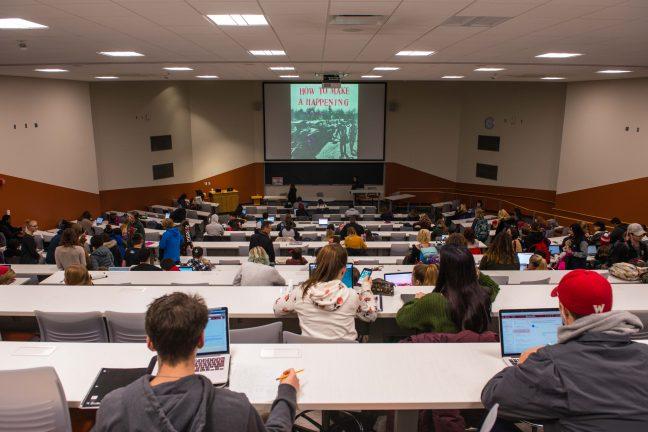The University of Wisconsin has recently renewed its contract with Honorlock, an online test monitoring software that purports to help secure testing and reduce cheating.
It was first used during the summer of 2020 at UW, and the current contract will run through at least the end of this academic school year, according to Government Technology. Though the testing software did help find cases of academic misconduct in the 2020-21 school year, it invades the privacy of the students taking exams through Honorlock and should not be used by our professors.
Glenn Youngkin’s support for censorship of literature should concern you
Honorlock’s main problem is how it monitors students and collects their information. According to the Honorlock website, it certifies testing integrity in a couple ways. Honorlock’s methods are problematic because they take and stores identification information in addition to recording communications during an exam.
“With the growth of online education, verification of a student’s identity has become an important factor for success,” Honorlock’s website states. “Honorlock remote proctoring captures the content on the student’s ID along with their photo so you can be sure the student taking the remote exam is the student getting credit.”
The problem with these security measures is students should have a right to say whether or not they want to give their personal information to (yet another) company.
Everybody knows that Google and Facebook know a lot about us, but there are alternative platforms available that don’t collect all your data. Students required to use Honorlock, however, do not have the luxury to opt out of giving up their information.
Honorlock makes it very obvious, however, that they do not sell the data they collect like Facebook and Google. The company is similar to Apple in that they collect personal data but do not sell it to third parties for marketing or other purposes.
While this assurance can give students some peace of mind, Honorlock still faces some inherent problems in collecting personal identification information. If Honorlock gets hacked or ransomwared, for example, it would be concerning to give the company our information that could then be put on display on the internet by insidious outside players.
Rising Madison gun violence requires new public safety approach
As difficult as it is in the modern age, people should own their data and have some right to privacy online. Understandably, many younger people might not acknowledge this right because they have been giving it up for years. The increase in social media use requires you to give up that information.
According to a Pew Research Poll, only 9% of people 18 and under were “very concerned” with giving up their data to big companies or the government. Though many young people aren’t concerned about their data being collected, that doesn’t mean they should be required to give up their data by their school.
In addition to Honorlock infringing on our students’ privacy by collecting our information, it also costs money. According to Government Technology, it costs around $267,000, which could be saved if UW used other methods to discourage cheating.
The most obvious way of reducing that cost is returning to in-person classes. Most schools have done this this year, which has allowed most exams to go back to in person. Even if online exams are in the equation, there are ways to format remote exams that make cheating much harder or less useful.
Matt Farrell and Shannon Maheu — two professors at Fanshawe College in London, Ontario — provide a few options to make online testing secure, even if the students have open notes. One of the most important recommendations is making the test questions more challenging so that students’ notes won’t help as much with the test.
Many professors already do something similar to this. If you can answer every question on the test by simply looking at your notes or the textbook, then why even take the class? If you could just search for the answer online or find it quickly in a manual, why even learn it in the first place?
Venue change at UW-Madison shows Ted Cruz does not understand censorship
The two professors argue tests should ensure open notes do not make it easy. With Farrell and Maheu’s guiding example, exams both online and in-person should test how students can apply knowledge instead of just testing to see if the student memorized a list of facts.
Even if Honorlock was the only way to test securely online as a quick fix when COVID-19 hit, the pandemic made everyone do things that they were uncomfortable with. But the pandemic is over now, and professors should either make their exams in-person this year or not require students to give up their information through Honorlock.
There are alternative methods to ensure academic integrity — ones that wouldn’t cost the same amount of money or collect information from students in the long-run.
Jonathan Draeger ([email protected]) is a freshman studying economics.














